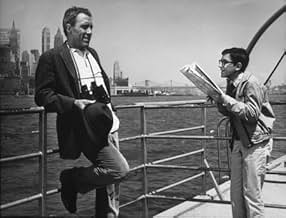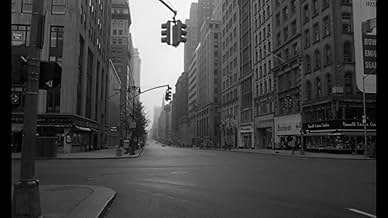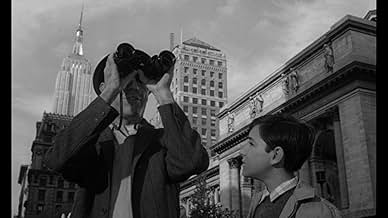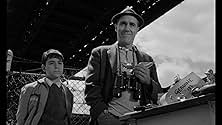Aggiungi una trama nella tua linguaA middle-aged iconoclast, doggedly avoiding the tedium of employment and conventional life, faces the prospect of losing custody of his young ward.A middle-aged iconoclast, doggedly avoiding the tedium of employment and conventional life, faces the prospect of losing custody of his young ward.A middle-aged iconoclast, doggedly avoiding the tedium of employment and conventional life, faces the prospect of losing custody of his young ward.
- Vincitore di 1 Oscar
- 4 vittorie e 7 candidature totali
- The Man in the Restaurant
- (as Phil Bruns)
- The Man in the Office
- (as John MacMartin)
- News Reporter
- (non citato nei titoli originali)
- Nick Burns' Double
- (non citato nei titoli originali)
Recensioni in evidenza
This movie caught my attention and prompted me to check out the screenplay from the library so I could experience the dialogue again and again.
There are so many one-liners and passages to admire, and you'll enjoy the charming performance on ukuleles of "Yes, Sir, That's My Baby" by Robards and Barry Gordon which is played against the background of Murray and Sandra exploring New York.
The sad thing about discovering a gem like this play for the first time is knowing that you won't experience that same pique of excitement and discovery again the second time through it again. But you do continue to marvel at the mind that can create such a fresh screenplay.
Unfortunately, I could not find much more information about the author, Herb Gardner, than what was on the cover jacket of the screenplay: He was born in Brooklyn and worked as a teen-ager selling orange-juice and checking coats at the Cort and National Theatres. "He saw some plays as many as 140 times and reports that that's an excellent way to learn the craft of the dramatist." He was also married to actress Rita Gardner.
Some favorite quotes:
"If most things aren't funny, Arn, then they're only exactly what they are; then it's one long dental appointment interrupted occasionally by something exciting, like waiting or falling asleep. What's the point if I leave everything exactly the way I find it? Then I'm just adding to the noise, then I'm just taking up some more room on the subway."
". . . it could have been any day, Arnie. . . sitting in the train going through any day. . . in the dark through any year. ... Arnie, it scared the hell out of me. You got to know what day it is. You got to know what's the name of the game and what the rules are with nobody else telling you. You have to own your days and name them, each one of them, every one of them, or else the years go right by and none of them belong to you. . . And that aint' just for weekends, kiddo. . . ."
The setting is New York City in the 60s and the movie excellently portrays the feeling of the city at that time. It features incredibly witty and clever dialogue that my family and I unceasingly quote from. This movie deals with the topics of conformity vs. individuality. A movie that can be watched over and over and enjoyed all the more with each viewing! It will enrich your life to see it.
I think some of the reviewers here (especially the ones giving it mixed reviews) are under the impression that the viewer is supposed to view Murray as a totally sympathetic character. He's not, and I don't think he's intended to be. Murray is really fun to be around for over half the movie; you're rooting for him all the way. As Sandy says, "No wonder Nick loves it here. I'd love to live here too if I were eleven years old!" When it's really time for Murray to settle down and do something to keep Nick, he can't bring himself to do it, and his free-spirited ways start looking, to the objective viewer, shallow and irresponsible. Murray needs to grow up, and do it fast, and growing up means compromising. That's the lesson; not that Murray was right all along, but that you can't be completely free if you do in fact have something left to lose, and Murray does. But life isn't a black and white choice between happiness and unhappiness, it's a continuum, and sometimes "doing the best you can" is enough.
I found it truly interesting that, throughout the movie, Nick was what Murray describes as "a middle-aged kid," seeming older than Murray himself. At the end, when Murray grows up, Nick seems to revert. He throws a full-scale tantrum, and that's the first time in the whole movie I remembered he was actually a child. I think that's a testament to Gordon's skill as an actor.
For anyone who read/saw the play: the director didn't seem to quite "get" the point of the play, and changed the end of the first and second (or is it second/third? I don't have it in front of me) to make the end of the movie more of a downer than the play. I never quite forgave him for that. The end of the play suggested that compromises have to be made, life goes on and it can even be good. The end of the movie seems to suggest that the last scene was unsubtly a "sell-out." I disagree. But I still loved the movie.
"Getting back to reality..." "I'll only go as a tourist!"
Lo sapevi?
- QuizAccording to William Daniels' memoir, several months after production on the film concluded, he attended a private screening of an initial cut that contained no location filming, no marching band music (as was featured in the play), and Paul Richards in the role of Leo Herman, not Gene Saks who had successfully played it on stage but was originally unavailable for filming (ironically, Richards had taken over the part of Leo from Saks in the original Broadway production). This early cut proved to be such a disappointment to the filmmakers, Herb Gardner decided to relinquish his screenwriting fee in exchange for permission from the producers to rewrite several scenes, hire the now-available Saks as a substitute for Richards, shoot a number of exterior scenes on location, and extensively re-edit the film into its final version.
- BlooperAfter Leo leaves the apartment, two different cardboard cutouts of him are used, with different facial appearances.
- Citazioni
Murray: I just want him to stay with me until I can be sure he won't turn into Norman Nothing. I want to be sure he'll know when he's chickening out on himself. I want him to get to know exactly the special thing he is or else he won't notice it when it starts to go. I want him to stay awake and know who the phonies are, I want him to know how to holler and put up an argument, I want a little guts to show before I can let him go. I want to be sure he sees all the wild possibilities. I want him to know it's worth all the trouble just to give the world a little goosing when you get the chance. And I want him to know the subtle, sneaky, important reason why he was born a human being and not a chair.
- Curiosità sui creditiIn opening credits: and introducing Barry Gordon as Nick. In the end credits, Gordon is credited to all the different names his character has tried: Nick Burns, Wilbur Malcome Burns, Theodore Burns, Raphael Sabatini, Dr. Morris Fishbein, Woodrow Burns, Chevrolet Burns, Big Sam Burns and Lefty Burns. In the film, however, he is called Nick, Nicky, and Nicholas.
- ConnessioniFeatured in The 68th Annual Academy Awards (1996)
- Colonne sonoreA Thousand Clowns
(1965)
Written by Judy Holliday and Gerry Mulligan
Sung by Rita Gardner
[Played before the opening titles]
I più visti
- How long is A Thousand Clowns?Powered by Alexa
Dettagli
Botteghino
- Lordo Stati Uniti e Canada
- 5.232.000 USD
- Tempo di esecuzione
- 1h 58min(118 min)
- Colore
- Proporzioni
- 1.66 : 1



























